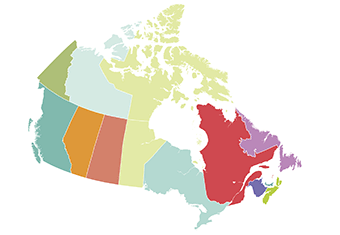The law of probate in Canada depends on the province. Please see below:
• Alberta
• British Columbia
• Manitoba
• New Brunswick
• Newfoundland and Labrador
• Northwest Territories
• Nova Scotia
• Nunavut
• Ontario
• Prince Edward Island
• Québec
• Saskatchewan
• Yukon
Probate in Alberta
Is a grant of probate required?
Generally, a grant of probate is required by institutions such as banks or land transfer agencies as proof that the executor has been certified by the court as having authority to act on behalf of an estate. In some situations a grant of probate is not required, which are outlined below.
What are the exceptions where a grant of probate is not required?
A grant of probate is not always necessary to transfer:
• Real estate that is jointly owned;
• Insurance proceeds that are payable to a named beneficiary;
• Joint bank accounts (although in some cases such accounts are the property of the estate);
• Registered government securities (under certain circumstances);
• Registered savings plans and Tax-Free Savings Accounts with a named beneficiary;
• Certain corporate securities such as private corporation shares and shareholder loans;
• Personal items;
• Automobiles and other vehicles;
• Canada Pension Plan Survivor’s Benefits; and
• Veteran’s pensions.
How do I obtain a grant of probate?
Step 1
The first step is to determine the type of grant which needs to be requested from the Court.
Three main types of grants may be obtained:
(1) If the will names a person to be the executor, that person should apply for a grant of probate.
(2) If the will does not name anyone as executor or the person named as executor is unable or unwilling to act, it will be necessary to apply for a grant of administration with will annexed.
(3) If the deceased died without a will, a potential personal representative will need to obtain a grant of administration.
Other types of grants may be sought for more complex situations. Such grants should be pursued with legal assistance.
Step 2
All of the required forms must be filled out in order to apply for the appropriate grant. A probate forms package is available for purchase from the Government of Alberta. You do not require a lawyer to complete the forms; however, legal advice is recommended. Lawyers have access to a new Surrogate Digital Service which can streamline the process and shorten the waiting time for a grant of probate by several months.
How much does it cost to obtain a grant of probate in Alberta?
The charges for a grant of probate in Alberta are determined based on the value of the estate in Alberta, as follows*:
(a) $35 for an estate worth up to $10,000
(b) $135 for an estate worth between $10,000 and $25,000;
(c) $275 for an estate worth between $25,000 to $125,000;
(d) $400 for an estate worth between $125,000 to $250,000; and
(e) $525 for an estate worth over $250,000.
*as of December 2022.
If a lawyer is retained, legal fees will be in addition to Court fees.
Top
Probate in British Columbia
In British Columbia, probate is also referred to as an “estate grant” or “representation grant”.
Is an estate grant required?
Generally, an estate grant is required by institutions such as banks or land transfer agencies as proof that the executor has been certified by the Court as having authority to act on behalf of an estate.
What are the exceptions where an estate grant is not required?
An estate grant is not always necessary to transfer:
- Real estate that is jointly owned;
- Insurance proceeds that are payable to a named beneficiary;
- Joint bank accounts between husband and wife or a parent and a minor child;
- Registered government securities (under certain circumstances);
- Registered savings plans with a named beneficiary;
- Certain private company interests (e.g. where the deceased had multiple Wills);
- Personal items;
- Automobiles and other vehicles (under a certain value);
- Bank accounts (under a certain value and depending on the bank’s policies);
- Canada Pension Plan Survivor’s Benefits; and
- Veteran’s pensions.
How do I obtain an estate grant?
Step 1
The first step is to determine the type of estate grant which needs to be requested from the Court.
Three main types of estate grants may be obtained:
- If the will names a person to be the executor, that person should apply for a grant of probate.
- If the will does not name anyone as executor or all persons named as executors are unable or unwilling to act or if the sole executor is a minor, it will be necessary to apply for a grant of administration with will annexed.
- If the deceased died without a will, a potential trustee will need to obtain a grant of administration without will annexed.
Other types of grants may be sought for more complex situations. Such grants should be sought with legal assistance.
Step 2
All of the required forms must be filled out in order to apply for an estate grant. A guide (PDF) to estate grant forms can be found on the Government of British Columbia website. The forms themselves are also available.
What is the cost of obtaining an estate grant of probate?
Whenever a grant of probate or administration is required, British Columbia charges a fee, called a “probate fee”, based on the value of estate assets at the date of the person’s death*:
- $0 for the first $25,000 of the estate;
- $6 for every $1,000 (or part of $1,000) between $25,000 and $50,000; and
Eg. If the estate is worth $35,100 the charge would be:
35,100 – 25,000 = 10,100
10,100 / 1,000 = 10.1 (11)
11*$6 = $66
- $14 for every $1,000 (or part of $1,000) by which the gross value of the estate exceeds $50,000:
Ex. If the estate is worth $100,000 the charge would be:
$150 for the first $50,000 plus;
100,000 – 50,000 = 50,000
50,000 / 1,000 = 50
50*$14 = $700
$150 + $700 = $850
*valid as of December 2022.
Estates with a value of $25,000 or less will not have probate fees. For estates with a gross value of over $25,000, court filing fees of $200 will be charged in addition to any applicable probate fees. Other grants may have additional or alternative fees.
Where do I file an estate grant application?
Estate grant applications need to be filed at a British Columbia Supreme Court registry. The British Columbia Justice website contains a list of British Columbia Supreme Court registries (PDF).
Probate in Manitoba
Is a grant of probate required?
Generally, a grant of probate is required by institutions such as banks or land transfer agencies as proof that the executor has been certified by the court as having authority to act on behalf of an estate. There are some situations for which a grant of probate is not required, which are outlined below.
What are the exceptions where a grant of probate is not required?
A grant of probate is not always necessary to transfer:
- Real estate that is jointly owned;
- Insurance proceeds that are payable to a named beneficiary;
- Joint Bank Accounts between husband and wife or parent and a minor child (although in some cases such accounts may be the property of the estate);
- Canada Savings Bonds (under certain circumstances);
- Registered savings plans with a named beneficiary;
- Certain corporate securities;
- Personal items;
- Automobiles and other vehicles;
- Canada Pension Plan Survivor’s Benefits; and
- Veteran’s Pensions.
In cases where a deceased left a Secondary Will (usually, covering interests in a private corporation (shares, shareholder loans, etc.)) and a Primary Will (usually, covering all other estate assets) and in the absence of an objection or opposition by the Attorney General, courts in Manitoba have also permitted grants of probate, limited to the estate covered by the Primary Will. However, such a limited grant cannot be sought if the deceased only left one Will.
How do I obtain a grant of probate?
Step 1
The first step is to determine the type of grant which needs to be requested from the Court.
Three main types of grants may be obtained:
- If the Will names a person to be the executor, that person should apply for grant of probate.
- If the Will does not name anyone as executor or the person named as executor is unable or unwilling to act, it will be necessary to apply for a grant of administration with Will annexed.
- If the deceased died without a Will, a potential trustee will need to obtain a grant of administration.
Other types of grants may be sought for more complex situations. Such grants should be pursued with legal assistance.
Step 2
Certain documents are required for each grant application. Court forms can be obtained from the following website: https://web2.gov.mb.ca/laws/rules/forms_e.php
Where do I file the grant application?
The grant application and other forms can be filed at any Judicial Centre of the Manitoba Court of King’s Bench, a list of which can be found https://www.manitobacourts.mb.ca/court-of-queens-bench/location-and-contact-info/
How much does it cost to obtain a grant of probate in Manitoba?
Probate Fees
Probate fees were eliminated in Manitoba as of November 6, 2020. Accordingly, requests for probate, administration, or resealing in Manitoba no longer require payment of a probate fee (previously, $70 for the first $10,000 of an estate, and $7 for every additional $1,000 or fraction thereof). The applicable legislation, now renamed The Court Services Fees Act (Manitoba), still maintains that the Court may charge a processing fee for such requests; however, the fee would need to be prescribed by regulation and is expected to be nominal.
Other Fees
Current fees for applications, etc. can be found by following this link: https://www.gov.mb.ca/justice/courts/fees.html
Probate in New Brunswick
The process of probate in New Brunswick is concluded by the Probate Court issuing what is known as “Letters Probate” or “Letters of Administration”.
Is probate required in New Brunswick?
In New Brunswick, probate of an estate is often required where the deceased owns an interest in real estate or land. In addition, it is generally required by financial institutions as proof that an individual (generally the executor) has been certified by a Court as having the authority to act on behalf of an estate. In addition to the foregoing most common reasons, there may be additional reasons particular to an estate that would require probate of that estate.
What are the exceptions where probate is not required?
In the Province of New Brunswick, probate may not be necessary if it is a very small estate or the estate is left entirely to the executor or the surviving spouse and it is unlikely to be challenged. Probate of an estate is not generally necessary to transfer:
- Real estate that is jointly owned;
- Insurance proceeds that are payable to a named beneficiary;
- Jointly held bank or investment accounts (although in some cases such accounts are the property of the estate);
- Canada Savings Bonds (under certain circumstances);
- Tax free savings accounts with a named beneficiary
- Registered savings plans with a named beneficiary (such as an RRSP or RRIF);
- Certain corporate securities;
- Personal items;
- Automobiles and other vehicles;
- Canada Pension Plan Survivor’s Benefits; and
- Veteran’s pensions.
How do I obtain probate?
Step 1
The first step is to determine the type of estate grant which needs to be requested from the Court.
Three main types of estate grants may be obtained:
- If the deceased died with a Will and it names a person to be the executor, that person should apply for letters probate of a Will.
- If the deceased died with a Will and it does not name anyone as executor or the person named as executor is unable or unwilling to act as executor, it will be necessary to apply for letters of administration with Will annexed.
- If the deceased died without a Will, the next of kin or a potential trustee will need to apply for letters of administration.
Other types of grants may be sought for more complex situations. Such grants should be pursued with legal assistance.
Step 2
All of the required forms and accompanying documents together with the probate fee must be filed in order to apply for an estate grant. The designated forms can be found on the New Brunswick Probate Court website.
Where do I file the probate application?
The probate application should be filed at the New Brunswick Probate Court Location in the jurisdiction in which the deceased resided at the time of death or where the deceased’s property is located. A list of Court locations is available online.
How much does it cost to obtain probate in New Brunswick?
New Brunswick has both a probate tax and probate fees. All probate applications are subject to probate tax, but standard requests for probate are generally not subject to probate fees.
New Brunswick probate taxes are dependent on the value of the estate. As of December 2022, the amount of tax payable is as follows*:
Where the value of the estate:
| (a) |
does not exceed $5,000 |
$25.00 |
| (b) |
exceeds $5,000 but not $10,000 |
$50.00 |
| (c) |
exceeds $10,000 but not $15,000 |
$75.00 |
| (d) |
exceeds $15,000 but not $20,000 |
$100.00 |
| (e) |
exceeds $20,000 |
$5.00 per $1,000 or part of $1,000 |
*valid as of December 2022.
There may be Court filing fees in addition to applicable probate tax. If a lawyer is retained, legal fees will be in addition to Court fees.
Estates valued at less than $3,000 may be administered by the Public Trustee without a Court appointment.
Top
Probate in Newfoundland and Labrador
The process of probate in Newfoundland and Labrador is concluded by the court issuing what is known as a grant of “letters of probate.”
Are letters of probate required?
Within Newfoundland and Labrador, letters of probate are required where the deceased owns an interest in real estate or land in their sole name when they die. In addition, letters of probate are generally required by financial institutions above a certain dollar amount (each financial institution sets this limit themselves). The letters of probate act as proof that an executor has been certified by the Court as having authority to act on behalf of an estate.
What are the exceptions where letters of probate are not required?
In the province of Newfoundland and Labrador, few items are exempt from probate. These items are generally limited to very small estates or estates left entirely to the executor that are unlikely to be challenged. That being said, letters of probate are not always necessary to transfer:
- Real estate that is jointly owned;
- Insurance proceeds that are payable to a named beneficiary;
- Jointly held bank or investment accounts (although in some cases such accounts are the property of the estate);
- Canada Savings Bonds (under certain circumstances);
- Registered savings plans with a named beneficiary;
- Certain corporate securities;
- Personal items;
- Veteran’s pensions.
How do I obtain letters of probate?
Step 1
The first step is to determine the type of grant which needs to be requested from the Court.
Three main types of estate grants may be obtained:
- If the Will names a person to be the executor, that person should apply for a grant of letters of probate.
- If the Will does not name anyone as executor or the person named as executor is unable or unwilling to act, it will be necessary to apply for a grant of letters of administration with Will annexed.
- If the deceased died without a Will, a potential trustee will need to obtain a grant of letters of administration.
Other types of grants may be sought for more complex situations, including where an administrator of an estate dies or becomes incapable of continuing with his or her duties after a grant is made, but prior to the completion of the administration. Such grants should be pursued with legal assistance.
Step 2
All of the required forms must be filled out in order to apply for an estate grant. The requisite forms can be found on the Supreme Court of Newfoundland & Labrador website.
Where do I file the probate application?
The probate application should be filed at any Newfoundland and Labrador Probate Office. A list of probate offices can be found online.
How much does it cost to obtain letters of probate in Newfoundland and Labrador?
The charges for obtaining letters pf probate in Newfoundland and Labrador are as follows*:
- $60 for the first $1,000 of the estate; and
- $0.60 for every additional $100 over $1,000.
*valid as of December 2022.
Court filing fees will be charged in addition to any applicable probate fees. If a lawyer is retained, legal fees will be in addition to Court fees.
Is there anywhere else I can go for additional information?
The Public Legal Information Association of Newfoundland and Labrador provides additional resources for both executors and those looking for information following the loss of a friend or relation. These resources are provided through the Supreme Court of Newfoundland and Labrador online.
Top
Probate in Northwest Territories
The process of probate in the Northwest Territories is concluded by the court issuing what is known as a “grant of probate.”
Is a grant of probate required?
In the Northwest Territories, a grant of probate is required where the deceased owns real estate or land that is not jointly owned with someone else. In addition, a grant of probate is generally required by financial institutions as proof that an executor has been certified by the court as having authority to act on behalf of an estate.
Alternatively, if the estate is worth less than $35,000, an interested party may file for a court declaration that the estate is a “small estate.” If the court issues a declaration that an estate is a Small Estate, it can be administered without further probate measures.
What are the exceptions where a grant of probate is not required?
A grant of probate is not always necessary to transfer:
- Real estate that is jointly owned;
- Insurance proceeds that are payable to a named beneficiary;
- Canada Savings Bonds (under certain circumstances);
- Registered savings plans with a named beneficiary; and
- Veteran’s pensions.
How do I obtain a grant of probate?
Step 1
The first step is to determine the type of grant which needs to be requested from the Court.
Three main types of grants may be obtained:
- If the Will names a person to be the executor, that person should apply for grant of probate.
- If the Will does not name anyone as executor or the person named as executor is unable or unwilling to act, it will be necessary to apply for a grant of administration with Will annexed.
- If the deceased died without a Will, a potential trustee will need to obtain a grant of administration.
Other types of grants may be sought for more complex situations. Such grants should be pursued with legal assistance.
Step 2
All of the required forms must be filled out in order to apply for probate. The requisite forms can be found on the Northwest Territories Department of Justice website.
Where do I file the probate application?
The probate application should be filed with the Supreme Court of the Northwest Territories. Contact and location details for the court registries are provided online.
How much does it cost to obtain a grant of probate in the Northwest Territories?
Probate fees in the Northwest Territories are calculated based on the value of assets that are in the estate. The following is a table of applicable fees*:
| (a) |
$10,000 or under |
$30.00 |
| (b) |
More than $10,000 but not more than $25,000 |
$110.00 |
| (c) |
More than $25,000 but not more than $125,000 |
$215.00 |
| (d) |
More than $125,000 but not more than $250,000 |
$325.00 |
| (e) |
More than $250,000 |
$435.00 |
*valid as of December 2022. Source: https://www.justice.gov.nt.ca/en/files/legislation/seizures/seizures.r2.pdf
Court filing fees will be charged in addition to any applicable probate fees. Other grants may have additional or alternative fees.
Top
Probate in Nova Scotia
The process of probate in Nova Scotia begins with a Court issuing what is known as “a grant of probate” or simply a “grant”.
Is a grant of probate required?
In Nova Scotia, a grant of probate is required if the deceased owns an interest in real estate or land in their sole name when they die. In addition, a grant of probate is generally required by financial institutions holding assets in the name of the deceased above a certain dollar amount (each financial institution sets this limit themselves). The grant acts as proof that an executor has been certified by the court as having authority to act on behalf of an estate.
What are the exceptions where a grant of probate is not required?
A grant of probate is not always necessary to transfer:
- Real estate that is jointly owned;
- Insurance proceeds that are payable to a named beneficiary;
- Jointly held bank or investment accounts (although in some cases such accounts are the property of the estate);
- Canada Savings Bonds (under certain circumstances);
- Tax free savings accounts with a named beneficiary
- Registered savings plans with a named beneficiary (such as an RRSP or RRIF);
- Certain corporate securities;
- Personal items;
- Automobiles and other vehicles;
- Canada Pension Plan Survivor’s Benefits; and
- Veteran’s pensions.
How do I obtain a grant of probate?
Step 1
The first step is to determine the type of estate grant to be applied for from the Court.
Three main types of estate grants may be obtained:
- If the Will names a person or trust company to be the executor, that person or trust company should apply for a grant of probate.
- If the person named as executor in the Will is unable or unwilling to act, it will be necessary to apply for a grant of administration with Will annexed.
- If the deceased died without a Will, someone eligible will need to obtain a grant of administration.
Other types of grants may be sought for more complex situations. Such grants should be pursued with legal assistance.
Step 2
All of the required forms must be filled out in order to apply for probate. The requisite forms can be found at any Nova Scotia Probate Court administration office or online.
A probate tax will be applicable to any estate filed for probate, with the amount calculated based on the value of assets in the estate. The value of these assets and the amount of probate tax due must be calculated, and payment submitted when the application is filed with the Court.
Where do I file the application for a grant of probate?
The probate application should be filed at any Nova Scotia Probate Court administration office. A list of the locations is available online.
How much is probate tax in Nova Scotia?
The tax rates set out in the Nova Scotia Probate Act are as follows:
(i) in estates not exceeding $10,000 $85.60
(ii) in estates exceeding $10,000 but not exceeding $25,000 $215.20
(iii) in estates exceeding $25,000 but not exceeding $50,000 $358.15
(iv) in estates exceeding $50,000 but not exceeding $100,000 $1,002.65
(v) in estates exceeding $100,000 $1,002.65 + $16.95 for every $1,000 or portion thereof in excess of $100,000
*valid as of December 2022
Court filing fees will be charged in addition to any applicable probate tax. If a lawyer is retained, legal fees will be in addition to Court fees.
Where can I find more information on probate in Nova Scotia?
Additional resources such as probate checklists, guidance on forms and self-representation throughout the probate process is available on the Nova Scotia Probate Court website.
Probate in Nunavut
Probate in the Nunavut is also referred to as a grant of probate or simply a grant. The use of the term grant refers to the outcome of the process, i.e., the Court granting probate.
Is a grant of probate required?
In Nunavut, a grant of probate is required where the deceased owns real estate or land that is not jointly owned with someone else. In addition, a grant of probate is generally required by financial institutions as proof that an executor has been certified by the Court as having authority to act on behalf of an estate.
Alternatively, if the estate is worth less than $35,000, an interested party may file for a Court declaration that the estate is a “Small Estate.” If the Court issues a declaration that an estate is a Small Estate, it may be administered without further probate measures.
What are the exceptions where a grant of probate is not required?
A grant of probate is not always necessary to transfer:
- Real estate that is jointly owned;
- Insurance proceeds that are payable to a named beneficiary;
- Canada Savings Bonds (under certain circumstances);
- Registered savings plans with a named beneficiary; and
- Veteran’s pensions.
How do I obtain a grant of probate?
Step 1
The first step is to determine the type of grant which needs to be requested from the Court.
Three main types of grants may be obtained:
- If the Will names a person to be the executor, that person should apply for grant of probate.
- If the Will does not name anyone as executor or the person named as executor is unable or unwilling to act, it will be necessary to apply for a grant of administration with Will annexed.
- If the deceased died without a Will, a potential trustee will need to obtain a grant of administration.
Other types of grants may be sought for more complex situations. Such grants should be pursued with legal assistance.
Step 2
All of the required forms must be filled out in order to apply for probate. The requisite forms can be found online on the Nunavut Courts website.
Where do I file the grant application?
The grant application should be filed with the Nunavut Court Registry. Contact and location details are available online.
How much does it cost to obtain a grant of probate in Nunavut?
Probate fees in Nunavut depend on the value of assets that are in the estate. The following is a table of applicable fees*:
| (a) |
$10,000 or under |
$25.00 |
| (b) |
More than $10,000 but not more than $25,000 |
$100.00 |
| (c) |
More than $25,000 but not more than $125,000 |
$200.00 |
| (d) |
More than $125,000 but not more than $250,000 |
$300.00 |
| (e) |
More than $250,000 |
$400 |
*valid as of December 2022. Source: http://www.nunavutcourts.ca/probate-civil
Other grants may have additional or alternative fees.
Top
Probate in Ontario
In Ontario, the process of probating a Will is referred to as obtaining a Certificate of Appointment of Estate Trustee.
Is a Certificate of Appointment required?
Generally, a Certificate of Appointment is required by institutions such as banks or the Land Registry Office as proof that the executor has been certified by the Court as having authority to act on behalf of an estate.
What are the situations where a Certificate of Appointment is not required?
A Certificate of Appointment is not always necessary to transfer:
- Real estate that is jointly owned;
- Real estate that has a named beneficiary in the Will (under certain circumstances, such as real estate that is eligible for the “First Dealings Exemption”);
- Insurance proceeds that are payable to a named beneficiary;
- Joint bank accounts (although in some cases such accounts are the property of the estate);
- Registered government securities (under certain circumstances);
- Registered savings plans and Tax-Free Savings Accounts with a named beneficiary;
- Private company interests (shares, shareholder loans, etc);
- Personal items;
- Automobiles and other vehicles;
- Canada Pension Plan Survivor’s Benefits;
- Veteran’s pensions.
It should be noted that if just one asset under a Will requires a Certificate of Appointment, the entire Will (and all of the assets dealt with under it) is dealt with under a Certificate of Appointment.
How do I obtain a Certificate of Appointment?
There are two types of applications for Certificate of Appointment:
(1) Certificate of Appointment of Estate Trustee With a Will:
- If the Will names an executor who is willing to act as executor, the appointee will apply for a Certificate of Appointment of Estate Trustee with a Will.
- If the Will does not name an executor or estate trustee, the potential trustee will still apply for a Certificate of Appointment of Estate Trustee with a Will, but there is a more complex process to determine who is entitled to be appointed (generally, this will be the spouse and/or next of kin).
(2) Certificate of Appointment of Estate Trustee Without a Will:
- If the deceased died Without a Will, interested parties will need to obtain a Certificate of Appointment of Estate Trustee without a Will.
- There is a relatively complex process to determine who is entitled to be appointed as executor (generally, this will be the spouse and/or next of kin).
- The assets are divided in accordance with the intestacy rules contained in Part II of the Ontario Succession Law Reform Act, R.S.O 1990, c. S.26.
Should you choose to seek a Certificate of Appointment without professional assistance, you will need to complete and file the forms required for the Certificate of Appointment. However, it is strongly recommended that you obtain the assistance of a TEP in doing so.
All of the required forms must be completed in order to apply for a Certificate of Appointment. The requisite forms are available online.
How much does it cost to obtain a Certificate of Appointment in Ontario?
The charge for a Certificate of Appointment in Ontario is called “Estate Administration Tax.”
If the value of the estate is $50,000 or less, the estate is exempt from Estate Administration Tax. For estates valued over $50,000, the Estate Administration Tax is calculated as $15 for every $1,000 (or part thereof) of the value exceeding $50,000.*
*Valid as of December 2022.
Court filing fees will be charged in addition to any applicable probate fees. Other grants may have additional or alternative fees.
Is everything included in the Estate subject to the Estate Administration Tax?
No. The following assets are not included in the tax calculation:
- Anything passing to a joint owner;
- Insurance proceeds or pension plan proceeds that have a named beneficiary;
- RRSP or RRIF proceeds that have a named beneficiary;
- TFSAs that have a named beneficiary; and
- Any real property owned outside Ontario (which may be subject to probate fees or tax in the jurisdiction in which the land is located).
Where do I file the application for a Certificate of Appointment?
Applications can be filed at the office of the Ontario Superior Court of Justice for the county or district in which the testator had a fixed address at the date of death. If the deceased had no fixed address, the application is to be filed in the country or district in which the deceased held property at the date of death. A full listing of locations for the office of the Ontario Superior Court of Justice is available online.
What Additional Filings are Required?
An estate trustee is required to complete and file an Estate Information return with the Ministry of Finance within 180 days of the court granting a Certificate of Appointment of Estate Trustee.
Top
Probate in Prince Edward Island
The process of probate on Prince Edward Island is concluded by the court issuing what is known as “letters probate”.
Are letters probate required?
On P.E.I., if the deceased owned no real property and finances are held in jointly named accounts, then letters probate may not be necessary. Please consult a TEP to determine whether this exception may apply to you.
What are the exceptions where probate is not required?
Probate is not always necessary to transfer:
- Real estate that is jointly owned;
- Insurance proceeds that are payable to a named beneficiary;
- Canada Savings Bonds (under certain circumstances);
- Tax free savings accounts with a named beneficiary
- Registered savings plans with a named beneficiary (such as an RRSP or RRIF);
- Certain corporate securities;
- Personal items;
- Automobiles and other vehicles;
- Canada Pension Plan Survivor’s Benefits; and
- Veteran’s pensions.
How do I obtain letters probate?
Step 1
The first step is to determine the type of estate grant which needs to be requested from the Court.
Three main types of estate grants may be obtained:
- If the will names a person to be the executor, that person should apply for letters probate.
- If the will does not name anyone as executor or the person named as executor is unable or unwilling to act, it will be necessary to apply for a grant of administration with will annexed.
- If the deceased died without a will, a potential trustee will need to obtain a grant of administration.
Other types of grants may be sought for more complex situations. Such grants should be pursued with legal assistance.
Step 2
All of the required forms must be filled out in order to apply for probate. The requisite forms can be found online on the Supreme Court of Prince Edward Island website.
Where do I file the application?
An application for “letters probate” or a “grant of administration” should be filed with the Estates Section of the Supreme Court in Charlottetown.
What is the cost of probate in P.E.I.?
The cost of probate in P.E.I. depends on the “probate value” (those items in the will that require probate). The rates are as follows*:
| On estates with a probate value up to $10,000 |
$50 |
| $10,001 to $25,000 |
$100 |
| $25,001 to $50,000 |
$200 |
| $50,001 to $100,000 |
$400 |
| exceeding $100,000 |
$400 plus an additional $4 for every $1,000 or part of $1,000 in excess of $100,000 |
*Rates valid as of December 2022
Court filing fees will be charged in addition to any applicable probate fees. If a lawyer is retained, legal fees will be in addition to Court fees.
Where can I find more information on probate on P.E.I.?
Additional resources are provided online by the Community Legal Information Association of Prince Edward Island.
Top
Probate in Québec
Probate in Québec is a legal procedure before the Superior Court or a Quebec Notary to verify if a holographic Will or a Will signed in the presence of two witnesses (even if prepared by a lawyer) is the Will of the deceased and respects the formalities of what constitutes a valid Will under Quebec Law. In Québec, only a Will executed before a Québec notary under notarial form en minute is exempt from probate and will allow the succession to be settled immediately. In all cases, Will searches must be obtained from the Chambre des notaires du Québec and the Barreau du Québec to establish that the Will is indeed the last Will of the deceased.
Do you have to have a lawyer or notary draft your will in Québec?
No. A holographic Will written entirely by the testator and signed by such individual without the use of any mechanical process is a valid Will.It is not subject to any other formal requirements.
What are the fees for probate in Quebec?
There are no probate fees in Québec (other than the minimal court fee for filing the probate application for a holographic or witness Will), unlike other provinces in Canada where probate fees are based on the value of the assets situated in such province.
How do I probate a Will in Québec?
A holographic Will or a Will signed in the presence of two witnesses can be verified before the Superior Court or a Quebec Notary. The probate procedure will usually cost much more than had the Will been originally been prepared by a Quebec Notary. It may also lead to significant delays in settling the succession.
What are my duties as a liquidator?
A liquidator is the person who is designated to settle a succession. The duties of a liquidator involve identifying and contacting the heirs, determining the assets and liabilities of the succession, providing the heirs with an inventory of the succession’s assets and liabilities, recovering any amounts owed to the succession, paying the succession’s debts, paying legacies by particular title, submitting an account to the heirs and distributing the residue of the succession.
Top
Probate in Saskatchewan
Probate in Saskatchewan is commonly referred to as a “letters probate”.
Is a grant of probate required?
Generally, a grant of probate is required by institutions such as banks or land transfer agencies as proof that the executor has been certified by the court as having authority to act on behalf of an estate. In some circumstances the grant of probate may not be required for the transfer of property.
What are exceptions where a grant of probate is not required?
A grant of probate is not always necessary to transfer:
- Real estate that is jointly owned;
- Insurance proceeds that are payable to a named beneficiary;
- Joint Bank Accounts between husband and wife or parent and a minor child(although in some cases such accounts may be the property of the estate);
- Canada Savings Bonds (under certain circumstances);
- Registered savings plans with a named beneficiary;
- Certain corporate securities;
- Personal items;
- Automobiles and other vehicles;
- Canada Pension Plan Survivor’s Benefits; and
- Veteran’s pensions.
How do I obtain a grant of probate?
Step 1
The first step is to determine the type of grant which needs to be requested from the Court.
Three main types of grants may be obtained:
- If the Will names a person to be the executor, that person should apply for grant of probate.
- If the Will does not name anyone as executor or the person named as executor is unable or unwilling to act, it will be necessary to apply for a grant of administration with Will annexed.
- If the deceased died without a Will, a potential trustee will need to obtain a grant of administration.
Other types of grants may be sought for more complex situations. Such grants should be pursued with legal assistance.
Step 2
All of the required forms must be filled out in order to apply for probate. The requisite forms can be found online.
Where do I file the grant application?
The grant application should be filed at any Judicial Centre of the Saskatchewan Court of King’s Bench. A list of Judicial Centres of the Saskatchewan Court of King’s Bench and Registrars can be found online.
How much does it cost to obtain a grant of probate in Saskatchewan?
Probate Fees
A fee based on the value of the estate is payable at the court house on an application for probate and all types of applications for administration (other than de bonis non).
The probate fee is $7 on every $1,000 of value passing through the estate.
Court Fees
A filing fee is payable to the Local Registrar on filing an application for probate and all types of applications for administration (including de bonis non).
The flat fee is $200, plus an additional fee of $25 for issuing a Certificate of No Infants when one is requested.
Legal Fees
If a lawyer is retained to assist with the administration of the estate, fees will be payable to that lawyer. The fees are set out in the Rules of Court, which state that for ‘core services’ described in Rule 16-58, a lawyer’s fee may be no more than:
$1,500 plus 1% of the first $500,000 of the value of the estate
3/4% on the next $500,000 of the value of the estate; and
1/2% on the remaining value of the estate.
A lawyer may charge additional fees for non-core services described in Rule 16-58 provided the lawyer, before being retained, advises the personal representative in writing of the lawyer’s method of billing based on the following methods: (a) a percentage of the estate; (b) at a specified hourly rate; (c) as a fixed fee, or d) a combination of (a), (b) or (c).
Source: https://sasklawcourts.ca/kings-bench/wills-and-estates/probating-an-estate/
Top
Probate in the Yukon
Probate in the Yukon is also referred to as a grant of probate or simply a grant. The use of the term grant refers to the outcome of the process; the court granting probate.
Is a grant of probate required?
A grant of probate is required by the Land Titles Office where the deceased owns real estate or land that is not jointly owned with someone else. In addition, a grant of probate is generally required by financial institutions as proof that an executor has been certified by the court as having authority to act on behalf of an estate.
What are the exceptions where a grant of probate is not required?
A grant of probate is not always necessary to transfer:
- Real estate that is jointly owned;
- Insurance proceeds that are payable to a named beneficiary;
- Canada Savings Bonds (under certain circumstances);
- Registered savings plans with a named beneficiary; and
- Veteran’s pensions.
How do I obtain a grant of probate?
Step 1
The first step is to determine the type of grant which needs to be requested from the Court.
Three main types of grants may be obtained:
- If the Will names a person to be the executor, that person should apply for grant of probate.
- If the Will does not name anyone as executor or the person named as executor is unable or unwilling to act, it will be necessary to apply for a grant of administration with Will annexed.
- If the deceased died without a Will, a potential trustee will need to obtain a grant of administration.
Other types of grants may be sought for more complex situations. Such grants should be pursued with legal assistance.
Step 2
All of the required forms must be filled out in order to apply for probate. The requisite forms can be found online on the Yukon Supreme Court website.
Additional guidance on navigating the estate process is provided online by the Yukon Office of the Public Guardian and Trustee.
Where do I file the grant application?
The grant application should be filed with the Supreme Court of Yukon. Contact and location details are available online.
How much does it cost to obtain a grant of probate in the Yukon?
As of December 2022, the Yukon charges a flat fee of $140 as a probate filing fee for estates valued over $25,000. Fees may be charged by the Court for estates valued at less than $25,000 or for providing copies of documents. Other grants may have additional or alternative fees.
For further information, or assistance with obtaining letters probate, please contact a TEP.
 Canada
Canada  UK
UK














